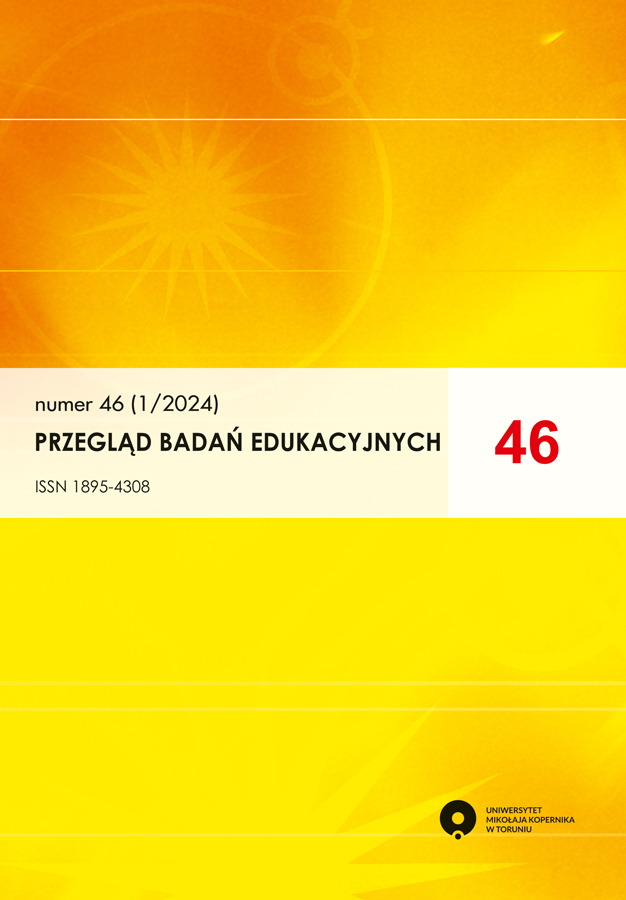Research on Development Needs in the Context of Innovative Methods of Providing Soft Skills and Professional Training through Virtual Reality to Persons with Disabilities – The Case of Poland
DOI:
https://doi.org/10.12775/PBE.2024.009Keywords
Virtual Reality, a human rights-based model of disability, labour market, professional training, soft skills trainingAbstract
This paper presents the results of quantitative research concerning people with various disabilities interested in participating in innovative methods of soft skills and professional training (improving professional competencies and preparing for entry into the labour market) through Virtual Reality. The research on the training needs of the target group was conducted within the project enabling people with disabilities to improve their professional competencies through the realisation of works in virtual space, carried out between July 2021 and October 2022. In this quantitative research, there were 255 participants from all over Poland (including 205 with mobility disabilities), who evaluated the proposal of the competency tests, soft skills and professional training developed as a part of the project. The opinions, expectations and needs of potential participants formed the basis for the substantive and practical development of training materials. This paper contributes to the research field in that the practical implications of the research analyses can constitute guidelines for training institutions and IT companies for developing educational services and products for people with disabilities.
References
Alhalabi, W. (2016). Virtual Reality Systems Enhance Students’ Achievements in Engineering Education. Behaviour & Information Technology, 35, 919–925, doi: 10.1080/0144929X.2016.1212931.
Allen, B., Hanley, T., Rokers, B., & Green, C.S. (2016). Visual 3D Motion Acuity Predicts Discomfort in 3D Stereoscopic Environments. Entertainment Computing, 13, 1–9, doi: 10.1016.
An, B., Matteo, F., Epstein, M., & Brown, D.E. (2018). Comparing the Performance of an Immersive Virtual Reality and Traditional Desktop Cultural Game. In: Proceedings of the 2nd International Conference on Computer-Human Interaction Research and Applications (pp. 54–61). Vol. 1. CHIRA. September 19–21, 2018. Seville, Spain.
Bal, M. (2012). Virtual Manufacturing Laboratory Experiences for Distance Learning Courses in Engineering Technology. In: Paper presented at the 119th ASEE Annual Conference and Exposition; June 10–13, 2012; San Antonio, TX. Retrieved 12 August 2023 from: https://peer.asee.org/virtual-manufacturing-laboratoryexperiences-for-distance-learning-courses-in-engineering-technology.pdf.
Bell, J.T., & Fogler, H.S. (2004). The Application of Virtual Reality to (Chemical Engineering) Education. Proceedings – Virtual Reality Annual International Symposium, 217–218, doi: 10.1109/VR.2004.1310077.
Bonaccio, S., Connelly, C.E., Gellatly, I.R., Jetha, A., & Martin Ginis, K.A. (2020). The Participation of People with Disabilities in the Workplace Across the Employment Cycle: Employer concerns and research evidence. Journal of Business and Psychology, 35, 135–158, doi: 10.1007/s10869-018-9602-5.
Bourhim, E.M., & Cherkaoui, A. (2020). Efficacy of Virtual Reality for Studying People’s Pre-Evacuation Behavior Under Fire. International Journal of Human Computer Studies, 142, 15, doi: 10.1016/j.ijhcs.2020.102484.
Bracq, M. S., Michinov, E., Arnaldi, B., Caillaud, B., Gibaud, B., Gouranton, V., et al. (2019). Learning Procedural Skills with a Virtual Reality Simulator: An Acceptability Study. Nurse Education Today, 79, 153–160, doi: 10.1016/j.nedt.2019.05.026.
Brasil, I.S., Neto, F.M.M., Chagas, J.F.S., de Lima, R.M., Souza, D.F.L., Bonates, M., et al. (2011). An Intelligent Agent-Based Virtual Game for Oil Drilling Operators Training. In: Paper presented at the 2011 XIII Symposium on Virtual Reality in May 23–26, 2011. Uberlandia, Brazil.
Cabada, E., Kurt, E., & Ward, D. (2020). Constructing a Campus-Wide Infrastructure for Virtual Reality. College & Undergraduate Libraries, 27(2–4), 281–304, doi: 10.1080/10691316.2021.1881680.
Campbell, A.G., Santiago, K., Hoo, D., & Mangina, E. (2017). Future Mixed Reality Educational Spaces. FTC 2016 – Proceedings of Future Technologies Conference, doi: 10.1109/FTC.2016.7821738.
Dobrowolska, M., & Knop, L. (2020). Fit to Work in the Business Models of the Industry 4.0 Age. Sustainability, 12(12), 4854, doi: 10.3390/su12124854.
Dobrowolska, M., & Deja, A. (2020). Education of Leaders in the Face of 4th Digital Revolution. In: N.C. Callaos, S. Hashimoto, N. Lace, B. Leybourne, & P. Poszytek (Eds.), 11th International Multi-Conference on Complexity, Informatics and Cybernetics (pp. 37–42). International Institute of Informatics and Systemics. Retrieved 12 August 2023 from: https://www.iiis.org/CDs2020/CD2020Spring/PapersZ2.htm ZA800ZT.pdf.
Dobrowolska, M., Ślazyk-Sobol, M., Arcienaga Morales, A.A., & Brodny, J. (2021). Research and Analysis of Working Conditions in Industrial Occupations: The Future. Work and Industry 4.0 in the Context of Industrial Revolution. Edition: Politechnika Śląska.
Dubovi, I., Levy, S.T., & Dagan, E. (2017). Now I Know How! The Learning Process of Medication Administration Among Nursing Students with Non-Immersive Desktop Virtual Reality Simulation. Computers & Education, 113, 16–27, doi: 10.1016/j.compedu.2017.05.00.
Lu, W., & Hindman, D.B. (2011). Does the Digital Divide Matter More? Comparing the Effects of New Media and Old Media Use on the Education-Based Knowledge Gap. Mass Communication and Society, 14(2), 216–235, doi: 10.1080/15205431003642707.
Makransky, G., Terkildsen, T.S., & Mayer, R.E. (2019). Adding Immersive Virtual Reality to a Science Lab Simulation Causes More Presence but Less Learning. Learning and Instruction, 60, 225–236, doi: 10.1016/j.learninstruc.2017.12.007.
Manpower. (2010). Developing Potential Future Employee: A New Way to Mismatch of Talent. Retrieved 12 August 2023 from: www.manpower.pl.
Smutny, P. (2022). Learning with Virtual Reality: A Market Analysis of Educational and Training Applications. Interactive Learning Environments, doi: 10.1080/10494820.2022.2028856.
Smutny, P., Babiuch, M., & Foltynek, P. (2019). A Review of the Virtual Reality Applications in Education and Training. 2019 20th International Carpathian Control Conference (ICCC), 1–4, doi: 10.1109/CarpathianCC.2019.8765930.
Downloads
Published
How to Cite
Issue
Section
License
Copyright (c) 2024 Małgorzata Dobrowolska, Magdalena Ślazyk-Sobol, Maria Flakus, Anita Pollak, Małgorzata Klich, Izabela Rusin, Justyna Trepka-Starosta, Damian Gąsiorek, Grzegorz Sikorski, Łukasz Górecki, Jarosław Brodny

This work is licensed under a Creative Commons Attribution-NoDerivatives 4.0 International License.
Stats
Number of views and downloads: 349
Number of citations: 0



